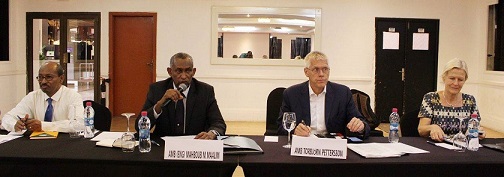
06 February 2019, DJIBOUTI (Djibouti): The Executive Secretary of the Intergovernmental Authority on Development (IGAD), H.E. Amb. (Eng) Mahboub Maalim, and the Ambassador of Sweden to Ethiopia and IGAD, H.E. Ambassador Torbjörn Pettersson, today co-chaired a consultative meeting during which representatives from embassies of Sweden to capital cities in the region discussed the IGAD drought resilience agenda with a team of IGAD senior staff and experts.
This one-day meeting was convened in follow up to Sweden’s expressed commitment to support the IGAD Drought Disaster and Resilience Sustainability Initiative (IDDRSI) within the framework of Sweden’s strategy for regional development cooperation and on-going support to IGAD in leading and coordinating the implementation of IDDRSI
The Executive Secretary recalled the Summit of the IGAD Heads of State and Government that was held in Nairobi in September 2011, during which leaders committed themselves to the collective objective of ensuring that droughts in the region ‘would never again turn into famine and other humanitarian emergencies’. He recounted the efforts that have since been engaged to address the effects of drought on populations of the region and reported that there have been achievements by the IGAD Secretariat in the coordinating efforts among Member States in their commitment to the regional goal of ending drought emergencies.
Ambassador Pettersson noted the importance of cross-border cooperation and coordination in the fight against drought effects. He expressed Sweden’s readiness to contribute to the efforts aimed at achieving the goal of ending drought disasters in the IGAD region. A Concept Note prepared by IGAD describing key activities related to its capacity and role in coordinating the implementation of IDDRSI, which was recently submitted to the Government of Sweden for consideration and support, was presented at the meeting.
The concept proposed several areas of focus, seeking to optimize the implementation of IDDRSI, including scaling resilience-enhancing technologies and innovations in cross-border areas; improving the capacity and partnership needed to achieve the objectives of IDDRSI; enhancing resilience to environmental and socio-economic shocks; and complementing other resilience-building projects, being funded by other partners, notably African Development Bank, World Bank, European Union and Germany.
ஜஜ۩END۩ஜஜ